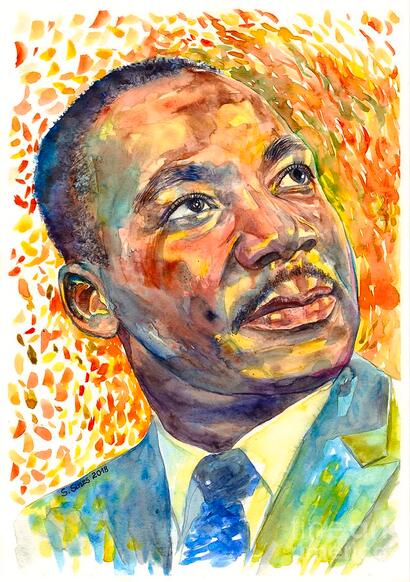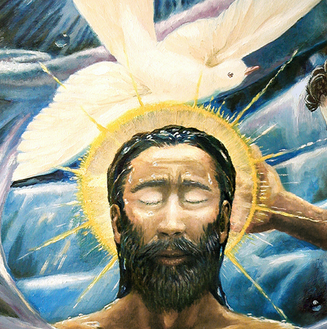January 19, 2020 – Dream Sunday, MLK Weekend
First Congregational Church of Cheshire
© the Rev. Dr. James Campbell
Romans 5:3-5
And not only that, but we also boast in our sufferings, knowing that suffering produces endurance, and endurance produces character, and character produces hope, and hope does not disappoint us, because God’s love has been poured into our hearts through the Holy Spirit that has been given to us.
I’ve loved birds for as long as I can remember. So you can imagine my delight when we moved to Connecticut, hung a bird feeder from the dogwood in the front yard, and watched from our living room as they came to feed. We’re have been lots of sparrows, some cardinals and blue jays to add a splash of color, the occasional yellow finch, and every now and again a redheaded woodpecker far too large for the feeder - but undeterred nonetheless. But there is one type of bird that has eluded my affections for a long time.
It all began years ago when I had a job in Times Square working for a theatrical press office. One day while running errands, the largest pigeon I had ever seen made a target out of me as I was walking down Broadway. Its gift was so forcefully delivered that it knocked the glasses right off my face! A few people screamed and everyone else kept their distance. I spent the next hour or two trying to clean myself up enough. And ever since then, I have regarded pigeons as the enemy.
My dislike of pigeons reached its crescendo some years later when we moved into a new apartment. It had windows on three sides, and after years in a very dark first floor apartment, we were hopeful for some sunshine. We didn’t have much, but every afternoon for about an hour the sun would light up the fire escape and cast a soft glow in all the rooms. When the spring came, I filled several planters with the brightest, reddest impatiens I could find. And every time I walked into the kitchen and looked out the window onto the fire escape, I had this feeling of deep satisfaction.
I loved my flowers. But unfortunately, so did the pigeons. Who knew pigeons ate impatiens?! They would sit in a row on the railing waiting for me to turn my back before they feasted. And then one day, to my horror, I discovered a pigeon actually roosting in one of my planters, its overfed body crushing the life out of them. I angrily chased it away. Every day, I chased all of them away. But every day those pigeons returned.
Finally, one of my neighbors told me about something called bird spikes – those awful little plastic spikes mounted on window ledges that would not kill the pigeons, but would certainly discourage them from landing. Soon every window ledge in our apartment looked like the Berlin Wall. I had conquered them or so I thought. -- But those pigeons were persistent, despite the obstacles. They found other places to land, still near enough to our windows for me to see what looked like disdain on their faces; still close enough for me to hear their constant cooing. They never let me forget that they were still there.
Emily Dickinson famously wrote: “Hope is the thing with feathers, that perches in the soul, and sings the tune--Without the words, And never stops at all…” Maybe Dickenson was thinking of pigeons when she wrote those words about hope, because hope, like pigeons, is persistent despite our best efforts to try to chase it away.
Hope both amazes and perplexes me. Human history should have beaten the hope right out of us by now. The sins of the fathers and mothers are indeed visited upon each generation. We seem doomed to repeat our history, and yet hope springs eternal. Hope sings on. Why is that? Why do we continue to hope despite all the evidence to the contrary? Why does hope survive in the face of what seem to be insurmountable obstacles blocking its fulfillment?
Last week in Confirmation class, as we prepared for this Sunday, I asked the students to name some of their fears and then to name some of their hopes. Their fears were significant. They wonder about the future of the planet as it warms, and what that will mean for them and their children and civilization, as we know it. They expressed fear that another world war was looming on the horizon. Serious stuff that worries me too. And yet, when I asked them about their hopes, they seemed to spring to life. They said they hope for a better future. They hope for unity and true acceptance among all people. They hope to make a positive difference in the lives of others. –In the midst of this fearful moment, where does their hope come from? Where does your come from?
From a psychological perspective, hope allows people to approach their problems with a frame of mind that encourages them to strategize for success. Hope increases the chances that you and I will actually accomplish our goals, despite difficulties. In this way, hope is essential for our flourishing and our psychological well-being. But again, where does it come from?
From a biological perspective, hope helps to ensure the survival of the species. Hope helps us to adapt and evolve and to even thrive in spite of tremendous obstacles. But where does it come from? And why is it so persistent?
St. Paul wrote to the Christians in Rome that, “hope does not disappoint us.” Now that was quite a statement to make in the first century because the Roman Empire was mighty and vast, while the church was small and weak. Even so, the early Christians were viewed as a threat to Rome. They were a threat to the social order because Christians claimed that a dusty rabbi named Jesus was Lord, while the Romans proclaimed that Caesar was Lord. That made the Christians heretics and politically dangerous. And so they were persecuted. Christians were hounded and imprisoned, discriminated against and martyred. And yet it was to these suffering people, living in the very seat of imperial power, that Paul proclaimed that their suffering would produce endurance, and their endurance would produce character, and their character would produce hope, and hope would not disappoint them.
This rather ridiculous message, that despite the state of the world, hope does not disappoint, has been the message of the church since the very beginning. What else could the resurrection mean except that hope is triumphant against all odds? That belief has inspired saints and sages throughout the centuries to do marvelous things. It has been the catalyst for massive social changes in every generation as people seek the Kingdom of God. And it was on full display on this day…
On August 28, 1963, the Rev. Dr. Martin Luther King, Jr. gave what is now considered one of the finest and most defining speeches in American history, entitled: “I Have a Dream.” Delivered to over 250,000 people gathered on the Mall in our nation’s capital, Dr. King argued for the resiliency of hope in the face of overwhelming odds; hope in the face of entrenched racial discrimination and the violence that protected it.
Interestingly enough, Dr. King’s prepared remarks that day did not contain the most famous words we all know – that refrain “I have a dream.” That phrase was actually from other speeches he had given previously, but did not plan to give that day. But one point while delivering his prepared remarks, the great Gospel singer Mahalia Jackson, who had sung before his speech, shouted out from the crowd, “Tell them about the dream, Martin.”
And going off script, he that’s exactly what he did. Dr. King did what God’s prophets have always done. He spoke the hopeful word of the Lord, despite how ludicrous it sounded. He spoke the word of the Lord, despite the current circumstances of the people. He spoke the word of the Lord and it stirred hope in the hearts of those people. And it was a hope that did not disappoint, as that moment became a catalyst for change in American society.
I cannot listen to his speech without tears. No matter how many times I have heard it, its words move something deep inside of me. It’s hope. And hope, it seems to me, is so resilient because it comes from God. And it rises in us because we are made in the image and likeness of God. Therefore it is irrepressible. It calls to us, because it bears witness to a truth that is larger than we are. It rises in us, despite all odds, and sometimes it even changes the world.
And because that is true, because history bears that out as the truth, it seems to me that the most important thing the church can do in this world is to feed and water the hope God has planted in each person. If we don’t do that, who will? Who will remind the people that they are made in the image and likeness of God? Who will tell them, again and again and again, until they believe it, that they are loved beyond compare? Who will proclaim to them that this present moment need not define the future? Who will help them to see beyond this world’s brokenness to its shattering beauty? Who will show them a hope that does not disappoint?



 RSS Feed
RSS Feed